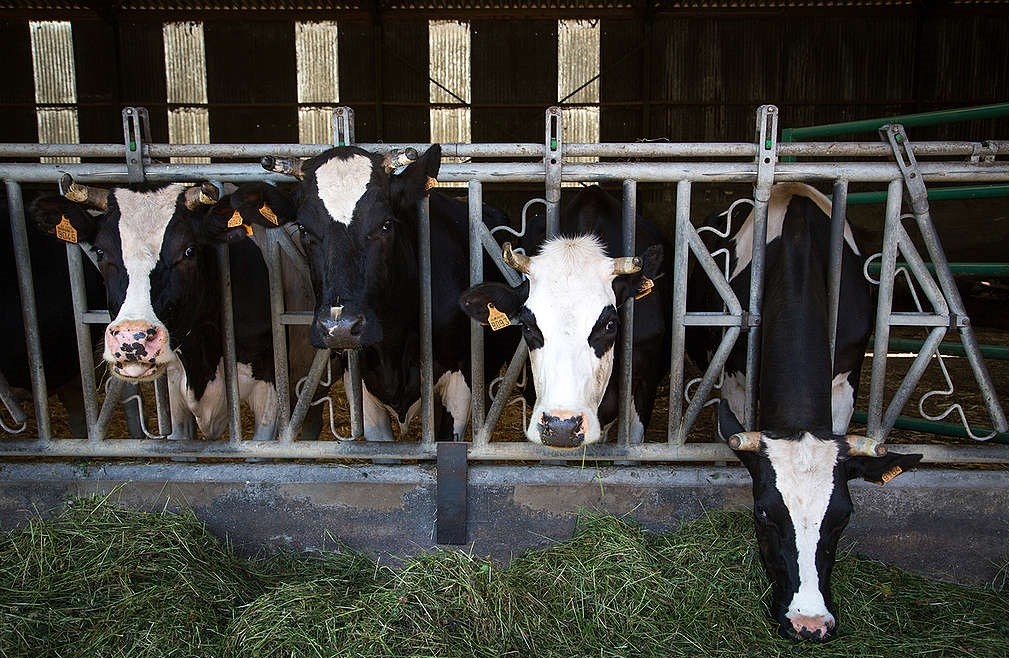At a recent event in the European Parliament, Compassion in World Farming EU joined other organisations in calling for a meat tax to offset the environmental, social and animal welfare costs caused by animal farming.
The revenues from such a tax can help consumers transition to better diets, specifically diets rich in plant-based foods.
During the event, the research group CE Delft presented a proposal, calling for an initial tax or sustainability charge of € 0.52 a kilo on beef and veal, € 0.41 a kilo on pork and € 0.18 a kilo on chicken. These would gradually be increased to € 5.70 a kilo on beef and veal, € 4.50 a kilo on pork and € 2.04 a kilo on chicken.
Taxes to support the underprivileged and fund better diets
Excessive levels of meat consumption are associated with the growing global public health burden of non-communicable diseases, including cardiovascular disease, type-2 diabetes and certain cancers. For example, processed meat such as bacon, ham and salami is classified as a carcinogen, in the same category as arsenic, asbestos and tobacco.
Governments should use the revenue from taxes on meat to support citizens to improve their diets. This additional public revenue should then be used to help those in the low-income category in the transition, through mechanisms such as food vouchers or tax returns.
Any additional revenues coming into the public coffers can also be used to lower the VAT on healthier food, such as fruits, vegetables and nuts, aiming to incentivise citizens to improve their diets. This in turn would lead to lower healthcare costs – with benefits to both patients and taxpayers who fund the public health system.
Taxes to help farmers and developing countries transition to sustainable agriculture
Animal farming is responsible for 14.5% of all greenhouse gas emissions produced by human activity. About 30% of the total human-induced biodiversity loss is related to farm animal production. Animal agriculture also leads to water and air pollution, excessive water and land use, deforestation, soil degradation, and overfishing.
Despite the stark facts that have long been known to scientists and policy makers, animal farming continues unabated. Projected increases at European and global level will lead us further away from addressing the global challenges we face and meeting the UN Sustainable Development Goals.
Introducing sustainability charges on meat would reflect the real costs of meat production and would reduce consumption of meat significantly. This in turn would result in fewer greenhouse gas emissions and limit environmental degradation caused by animal agriculture.
Governments could use part of the revenues from such taxes to provide subsidies to those farming in accordance with high environmental standards and support developing countries in the fight against the climate crisis by funding, for example, reforestation.
Taxes to help animals lead better lives
Most of all, it should not be forgotten that our overconsumption of animal products increases animal suffering. In the EU, an estimated 9 billion land farm animals are slaughtered each year and over two thirds of farm animals in Europe are raised in industrial farms. Despite the recognition of animals as sentient beings in EU law, the intensification of animal farming has led to more suffering and poorer animal welfare across Europe.
Industrial farming systems force animals to live in severe confinement, where they are prevented from performing many natural behaviours and as a result experience extreme frustration. These stressful living conditions and often unnatural diets make them prone to infections. Animals in factory farms have been selectively bred for fast growth and high yields causing many to suffer from life-long health problems.
Intensively-farmed animals are also subject to mutilations performed without anaesthesia or pain relief. A significant reduction in the consumption of products of animal origin will reduce the overall numbers of animals farmed and hopefully encourage higher animal welfare standards in farming as citizens pay more attention to how their food is produced.
The EU needs to take the lead
The first step the EU should take is to end the perverse subsidies that prop intensive farming, as currently allocated through the EU farm subsidies scheme, the Common Agricultural Policy. This is not a new idea – last year Members of the EU Parliament’s Environment Committee backed cuts to funding for factory farms and called for higher environmental and animal welfare criteria for EU farm subsidies.
Another important step would be concrete measures to improve welfare. One key measure is to phase out the use of all cages used in animal farming. In the EU alone, over 300 million animals spend all or part of their lives imprisoned in cages every year.
Across Europe, over 170 non-governmental organisations backed a European Citizens’ Initiative to end the use of cages, having collected over 1.6 million signatures over the course of a year. The initiative is supported by a cross party group of MEPs. The call for a phase out of cages is also echoed by the Committee of the Regions.
To help consumers and farmers in the transition, a sustainability charge on meat – with an emphasis on products from factory farms – should be collected. Governments may then use this revenue to help better nourish their citizens, in particular those in low income households, fight against the climate crisis and improve the lives of animals, as expected in a union of nations claiming leadership in social and environmental standards globally.
By Olga Kikou
Olga Kikou is Head of Compassion in World Farming EU – a non-governmental organisation that campaigns to improve EU laws and policies for farm animals.


